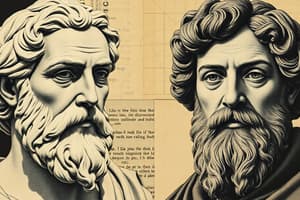Podcast
Questions and Answers
Why did Plato's philosophical life take a significant turn after the death of Socrates?
Why did Plato's philosophical life take a significant turn after the death of Socrates?
- Socrates' execution made Plato question the nature of Athenian democracy and its treatment of intellectuals. (correct)
- Plato realized that he could use Socrates' legacy to gain political power in Athens.
- Plato's death was imminent after Socrates' execution.
- Socrates' death led to Plato's abandonment of philosophy and his focus on seeking political power.
- Plato was exiled from Athens following Socrates' death.
- Plato's execution was a direct consequence of Socrates' condemnation.
- Plato believed that Socrates' death showed the importance of following the political party line in order to survive.
- Plato believed that Socrates' death was a just punishment for his teachings.
What was Plato's initial ambition for his life?
What was Plato's initial ambition for his life?
- To travel the world and spread his philosophical beliefs.
- To live a life of solitude and contemplation.
- To be a successful entrepreneur and make a fortune in the Athenian marketplace.
- To achieve political prominence and enact just policies. (correct)
- To become a tyrant and rule with an iron fist.
- To secure a government position and serve the Athenian populace.
- To lead a simple life as a farmer, avoiding the complexities of politics.
- To become a renowned poet and contribute to Athenian culture.
What events led to Plato's disillusionment with Athenian politics?
What events led to Plato's disillusionment with Athenian politics?
- The failure of Plato's own political aspirations and his inability to gain influence.
- The establishment of a tyrannical regime and its violent methods. (correct)
- The rise of democracy and the suppression of dissenting voices.
- The influx of foreign ideologies that undermined Athenian culture.
- The assassination of his mentor, Socrates, and the injustices that took place in Athenian courts. (correct)
- The growing popularity of demagoguery and the corruption of politicians.
- The emergence of a new political party that threatened Plato's ideals.
- The loss of the Peloponnesian War and the decline of Athenian power.
What did Plato hope to achieve by traveling the world?
What did Plato hope to achieve by traveling the world?
Why did Plato visit Syracuse, Sicily?
Why did Plato visit Syracuse, Sicily?
What was the ultimate outcome of Plato's encounter with Dionisio I?
What was the ultimate outcome of Plato's encounter with Dionisio I?
What did Plato believe to be the reason for Socrates' persecution?
What did Plato believe to be the reason for Socrates' persecution?
Based on Plato's experiences, what did he ultimately conclude about the role of the philosopher in society?
Based on Plato's experiences, what did he ultimately conclude about the role of the philosopher in society?
Flashcards
Plato
Plato
An ancient Greek philosopher, student of Socrates, known for his works on political theory and metaphysics.
Socrates' Death
Socrates' Death
The trial and execution of Socrates marked a turning point for Plato, influencing his philosophical outlook.
Thirty Tyrants
Thirty Tyrants
An oligarchic regime in Athens that ruled after the Peloponnesian War, which included acquaintances of Plato.
Pursuit of Justice
Pursuit of Justice
Signup and view all the flashcards
Philosopher-King
Philosopher-King
Signup and view all the flashcards
Syracuse Incident
Syracuse Incident
Signup and view all the flashcards
Political Disillusionment
Political Disillusionment
Signup and view all the flashcards
Crisis of Identity
Crisis of Identity
Signup and view all the flashcards
Study Notes
Plato's Life and Philosophy
- Born in Athens (428/27-347 BCE) to an aristocratic family.
- Early interest in politics.
- Educated with peers of similar social standing.
- Student of Socrates (around age 20).
- Socrates' death (399 BCE) profoundly impacted Plato's philosophy
The Oligarchy and the Return to Democracy
- Athenian defeat in the Peloponnesian War (404 BCE) led to an oligarchic regime.
- The Thirty Tyrants, an oligarchy aligned with the Spartans, took power.
- Two associates of Plato were involved in the governing body.
- The experience disillusioned Plato about Athenian politics and injustice.
- Democracy returned in 403 BCE, but Plato remained dissatisfied with political methods.
- The trial and death of Socrates further fueled Plato's disillusionment.
Plato's Travels and Disappointments
- Plato travelled to Italy (circa 388 BCE) likely to meet with Pythagoreans.
- Invited to Syracuse, Sicily, by tyrant Dionysius I.
- Hoped to inspire a 'philosopher-king'.
- Relationship with Dionysius I failed.
- Plato was briefly enslaved in Syracuse.
Plato's Philosophical Reflections
- Questioned Athenian society's treatment of Socrates.
- Questioned if society or Socrates was inherently flawed.
- Believed that Athenian society was governed by false opinions and appearances.
- Believed that only philosophers could reform unjust societies.
Plato's Academy
- Returned to Athens and founded the Academy.
- Undertook additional journeys to Syracuse to promote his ideal Republic.
- Unsuccessful in implementing his Republic.
Plato's Later Years
- Moved to Athens (360 BCE).
- Continued to lead his Academy until his death.
Studying That Suits You
Use AI to generate personalized quizzes and flashcards to suit your learning preferences.




